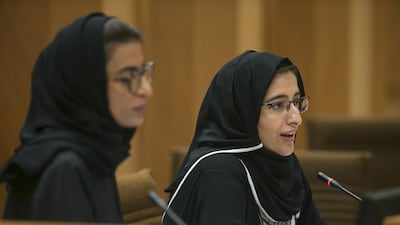ABU DHABI // So many Emirati men are choosing to marry foreign women that members of the Federal National Council have formed a special committee to look at the reasons why.
Members were told at an FNC session in the capital on Wednesday that more than a quarter of all Emirati marriages in 2014 were mixed.
Statistics provided by Hamad Al Rohoomi, member for Dubai, showed that of the 7,401 marriages across the country that year, 2,159 involved citizens taking expatriate women as wives.
To find out the reasons for mixed marriages and the effect they have on the make-up of Emirati society, 10 members of the FNC were asked to form a committee after discussing the issue with Najla Al Awar, the new social development minister. “This affects the national identity,” said Mr Al Rohoomi, adding that research was needed on how many of these marriages ended in divorce, what happened to any children and where they were raised.
“If Emirati men marry expats, then who will the Emirati women get married to?” said Mr Al Rohoomi, who emphasised that the issue was not a rejection of expats, but more a population concern.
Ms Al Awar told the FNC that a trend existed but data on the issue was often inconsistent.
“Until now I cannot put my hand on real percentages and this is a weakness. So we have different ratios, but whether these cases are increasing or decreasing, I would presume they are increasing. If we know the reasons, we will be able to do family guidance.”
Ms Al Awar also agreed to listen to the families of convicts who have not been receiving aid from the ministry, in answer to a question from RAK member Salem Al Shehhi.
The minister explained that the social service law granted allowances only to families of convicted prisoners serving a minimum of two months, had no other source of income, or if their alternative income was less than what they received before the conviction.
“This is being applied and I have seen this in the two months I have spent at the ministry,” Ms Al Awar said.
The FNC was told that 362 families received Dh38 million in aid last year, benefiting 795 individuals. “There is no cap for the aid,” Ms Al Awar said.
Mr Al Shehhi said if the convict had been a fugitive, the wife received about Dh5,000 per month from the social affairs ministry, but their children were left with nothing.
“So we should see why it was not included in the law and if we can raise exception cases to the cabinet,” he said
Ms Al Awar replied: “The member has brought to our attention that not all categories are covered by the law and sensing the needs of the people is our job.”
Mr Al Shehhi asked why the law set a prerequisite for the convict to be an Emirati.
“What about an Emirati woman married to an expat, would she receive aid if the prisoner is not a national?”
The council also passed a draft law to establish reconciliation centres at civil courts to help resolve disputes before reaching trial. RAK member Mohammed Al Mehrezi told the council a study should be conducted on “resolving spinsterhood and encouraging polygamy”.
“We prefer to call it late marriages,” said FNC speaker Dr Amal Al Qubaisi.
hdajani@thenational.ae


